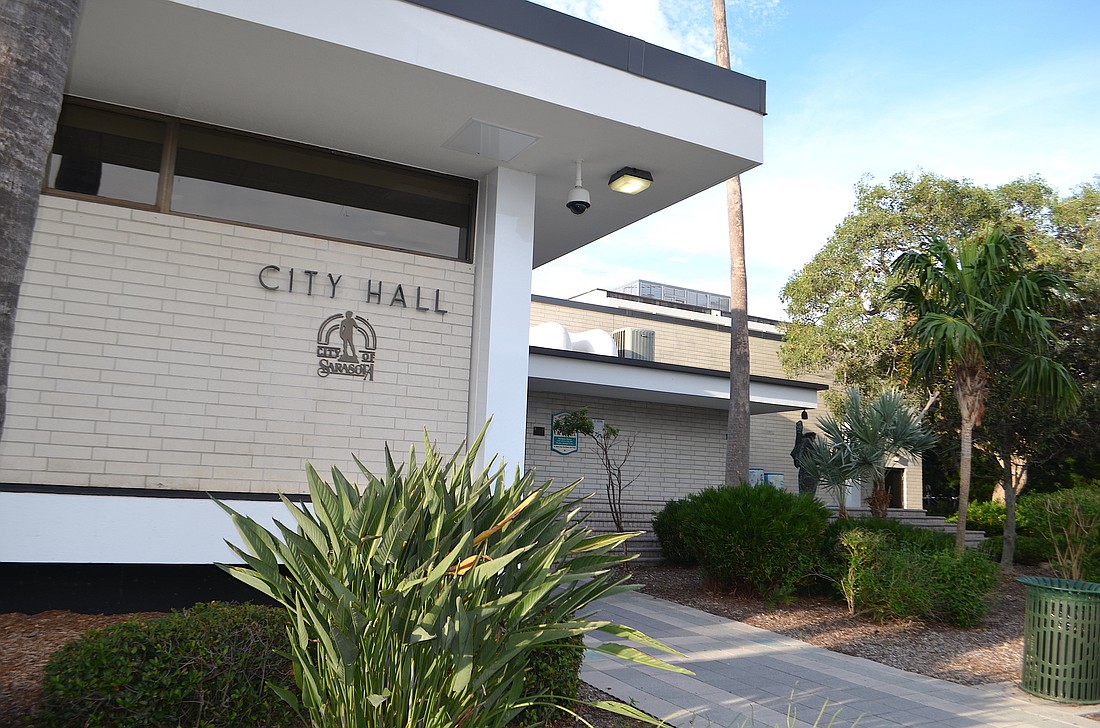- April 28, 2024
-
-
Loading

Loading
 Photo by Andrew Warfield
Photo by Andrew Warfield
Without naming names, Commissioner Erik Arroyo suspects some speakers who come before the Sarasota City Commission are paid lobbyists rather than ordinary concerned citizens.
To that end, at Monday’s commission meeting, he introduced the idea of drafting a lobbying and transparency ordinance that would require anyone being compensated to advocate in both public and private meetings to register with the city. He said a majority of jurisdictions in Florida have similar ordinances and that Sarasota should consider its own as well.
“This ordinance is, I believe, long overdue,” Arroyo said. “Imagine if we had 10 individuals come before us and five were paid consultants representing one voice. We would never know under our current system. I think it diminishes the voices and the concerns of the residents that are not being paid.”
Support among commissioners was lukewarm as they eventually voted 3-2 to instruct City Attorney Robert Fournier to spend a limited amount of time reviewing other ordinances and drafting points of discussion to bring to a future meeting. Commissioners Jen Ahearn-Koch and Debbie Trice opposed the measure, agreeing with Vice Mayor Liz Alpert that Arroyo’s concerns were not a real issue here.
“I’m certainly for transparency, but I don't know who we're talking about,” Alpert said. “Who has come before us who has been paid to lobby us? I can't think of any instances in the eight years I've been on the commission. Maybe there have been, but it's like a solution looking for a problem. Not that it's a bad thing, I just don't see where there's an issue here to set this whole thing in motion.”
Arroyo said the problem is commissioners and staff don’t know what they don’t know and either can be approached by paid lobbyists in public forum or private meetings, and separating true community advocacy from professional lobbying isn’t possible.
“This isn't about a specific person,” Arroyo said. “We have attorneys, we have consultants coming in front of us. We have engineers and architects who meet with us and tell us this would be a good thing and later on we see them at some point representing a client here, but it's impossible to tell on the outset. The reality is people approach us all the time and we don't know if they're doing it on their own behalf or on behalf of some special interest.”
Rob Grant, who speaks frequently before the commission on matters related to his Arlington Park neighborhood, cautioned that a lobbyist registration ordinance can go too far. He cited an ordinance in the Miami-Dade County town of Florida City, which classifies representatives of nonprofit organizations and homeowners associations, among other seemingly innocuous organizations, as lobbyists.
“So in this ordinance, that means that every CCNA-affiliated neighborhood association, board member or head of any of our arts organizations would have to register as a lobbyist before coming before you to speak on behalf of their organization,” Grant said.
He pointed to an Orlando ordinance that states any lobbyist contact with members of city boards outside of public meetings is prohibited, and that prior to any board meeting lobbyists must provide written documents to the recording secretary for dissemination to all board members.
“That's transparency. That’s controlling who has access to the levers of power,” Grant said. “I would recommend if you do this, move along the lines of the city of Orlando.”
Kelly Franklin, another frequent commenter on all city government matters, called a lobbyist ordinance redundant.
"We do not need the new laws or new paperwork to identify those who seek financial benefit from legislative action,” Franklin said. “We just need representatives with the ethical foundation, civic mindedness and judgment to follow the national, state and local rules we already have in place.”
Although Alpert said she didn’t believe Sarasota has a lobbying problem, she did support bringing the matter back, with input from Fournier, for further discussion. Trice, the lone freshman city commissioner, said Sarasota is a small enough town that identifying who is and who is not a lobbyist isn’t difficult, nor should that knowledge affect decisions made at the dais.